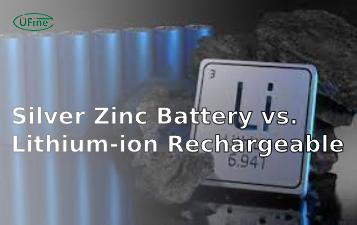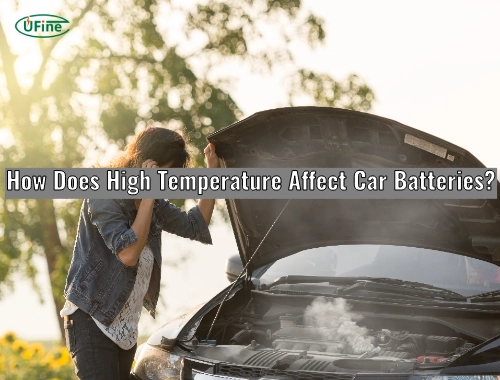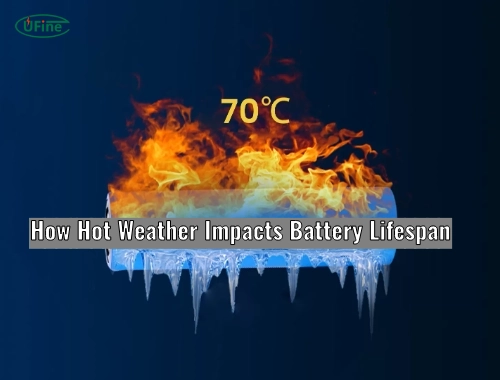
As temperatures rise during the summer, many vehicle owners may wonder about the effects of high temperatures on battery performance. Car batteries are essential for starting engines and powering electrical systems, but they are not immune to the challenges posed by extreme heat. This article will explore how high temperatures can negatively impact battery health, leading to potential failures. We will also discuss the types of batteries best suited for hot climates and provide actionable tips for maintaining battery performance in the heat.
Part 1. How does high temperature affect car batteries?
High temperatures can profoundly affect car batteries, particularly lead-acid and lithium-ion types. Understanding these effects is crucial for vehicle owners, especially in regions that experience extreme heat.
Fluid Evaporation
One of the most significant impacts of high temperatures on batteries is fluid evaporation. Car batteries contain an electrolyte solution that is vital for conducting electricity. When exposed to elevated temperatures, this fluid can evaporate quickly, leading to several issues:
- Impact on Performance: As the electrolyte level decreases, the battery’s ability to generate power diminishes. This can result in starting problems or even complete battery failure.
- Increased Maintenance Needs: Drivers may need to check and refill electrolyte levels more frequently during hot weather, adding to maintenance tasks.
Increased Corrosion Rates
Heat accelerates chemical reactions within the battery, leading to increased corrosion of internal components:
- Battery Terminals: Corrosion can build up on battery terminals, obstructing electrical flow and reducing efficiency. This can lead to poor connections and intermittent electrical issues.
- Internal Structures: Over time, corrosion can damage the battery’s internal plates, diminishing lifespan. This degradation can lead to reduced capacity and overall battery performance.
Risk of Overcharging
High temperatures can also increase the risk of overcharging:
- When a battery overheats, it may trick the charging system into supplying more power than necessary. This overcharging generates additional heat, creating a feedback loop that can cause permanent damage.
- Symptoms of Overcharging: Signs include swelling of the battery case and excessive heat generation during operation. If left unchecked, this can lead to leaks or even explosions in extreme cases.
Part 2. How hot weather impacts battery lifespan
The lifespan of a car battery is significantly affected by temperature extremes. Research indicates that batteries tend to fail more quickly in hot climates due to several factors:
Accelerated Aging
Batteries are designed to operate optimally within specific temperature ranges. Prolonged exposure to high temperatures accelerates aging processes:
- Chemical Reactions: Elevated temperatures speed up chemical reactions that degrade battery materials. For example, lead sulfate crystals can form more rapidly at higher temperatures, leading to sulfation and reduced capacity.
- Life Expectancy: A battery that might last five years in moderate conditions could fail within three years in extreme heat. This accelerated aging means drivers may need to replace their batteries more frequently in hot climates.
Diminished Capacity
As temperatures rise, the capacity of a car battery can diminish:
- Reduced Charge Acceptance: Hot batteries may not accept charge effectively, leading to incomplete charging cycles. This inefficiency can leave drivers stranded if they rely on their vehicles after short trips.
- Power Output Decline: The overall power output decreases under high temperatures, making it harder for the vehicle to start and run efficiently. This decline in performance can be particularly noticeable during peak summer months.
Part 3. Signs your battery may fail due to heat
Recognizing the signs of impending battery failure is vital for preventing breakdowns. Here are common indicators that your car battery may be suffering from heat-related issues:
Dimming Lights
If you notice your headlights or dashboard lights dimming while driving, it could indicate that your battery is struggling under high temperatures. This symptom often suggests that the battery is unable to maintain adequate voltage.
Slow Engine Crank
When starting your vehicle, a slow or difficult engine crank often signals that your battery is not delivering enough power due to heat damage. If you experience this regularly, it may be time for a battery check.
Swollen Battery Case
Physical signs such as a swollen or misshapen battery case indicate overheating and potential internal damage. A swollen case not only affects performance but also poses safety risks.
Part 4. Preventive measures for battery health in hot weather
Taking proactive steps can help maintain your car battery’s health during hot weather:
Regular Inspections
Conduct routine inspections of your battery and its connections:
- Check Fluid Levels: Ensure adequate electrolyte levels and refill with distilled water if necessary. Regular checks help prevent fluid evaporation from impacting performance.
- Clean Terminals: Regularly clean terminals with baking soda and water to prevent corrosion and dirt. This ensures optimal electrical flow and reduces the risk of connection issues.
Park Smartly
Where you park your vehicle can make a significant difference in battery health:
- Shade or Garage: Parish in shaded areas or garages to minimize heat exposure. Using reflective sunshades inside your windshield can also help keep cabin temperatures down.
- Avoid Direct Sunlight: Prolonged exposure to direct sunlight can significantly elevate under-hood temperatures, exacerbating any issues with your battery.
Drive Regularly
Frequent driving helps keep your battery charged and reduces the risk of discharge:
- Longer Trips: Aim for trips lasting at least 20 minutes to allow the alternator sufficient time to recharge the battery fully. Short trips may provide more time for proper charging.
Part 5. What types of batteries are best for hot climates?
Choosing the right type of car battery is crucial for longevity in hot climates. Here are some options that perform well under high-temperature conditions:
Absorbent Glass Mat (AGM) Batteries
AGM batteries are designed with advanced technology that makes them more resistant to heat and vibration:
- Benefits: They have lower self-discharge rates than traditional flooded batteries and better performance under high temperatures. AGM batteries are also sealed, reducing maintenance needs associated with fluid evaporation.
Flooded Lead-Acid Batteries
While these are common and affordable options, they may not perform as well in extreme heat:
- Maintenance Required: Regular maintenance, such as topping off fluid levels, is necessary for optimal performance. Due to increased evaporation rates, these batteries may require more frequent checks in hot weather.
Lithium-Ion High Temperature Batteries
Lithium-ion batteries have gained popularity due to their lightweight design and high energy density:
- Heat Resistance: Many modern lithium-ion batteries are designed for high-temperature environments, offering improved thermal management systems that help dissipate heat effectively.
- Longevity: When maintained adequately in hot conditions, these batteries typically have longer lifespans than traditional lead-acid types. They also charge faster and have higher discharge rates, making them suitable for modern vehicles with demanding electrical needs.
Part 6. FAQs
-
Can high outside temperature cause my car battery to go dead?
Yes, high outside temperatures can lead to fluid evaporation, increased corrosion rates, and overcharging risks, all of which contribute to premature battery failure. -
What temperature is too hot for a car battery?
Temperatures above 122°F (50°C) are considered too hot for a car battery and can significantly reduce lifespan. -
How often should I check my car battery in the summer?
It’s advisable to check your car battery at least once a month during the summer months for signs of wear or damage. -
Can I park my car outside in extreme heat?
While it’s possible, parking in shaded areas or garages is recommended to protect your battery from excessive heat exposure. -
What should I do if my car won’t start in hot weather?
If your car won’t start despite being relatively new, it’s wise to have your battery tested at an auto parts store or by a mechanic for potential overheating issues.
Related Tags:
More Articles

What is the Difference Between Silver Zinc Battery vs. Lithium-ion Rechargeable?
Compare silver zinc and lithium-ion rechargeable batteries: energy density, cycle life, safety, cost, and uses in drones, medical devices, EVs, and electronics.
What are Watts and Watt Hours in Battery?
Understand watt vs watt-hour in batteries: key differences, how to calculate capacity, and why they matter. Includes free comparison table.
Best 10 Blood Pressure Monitor Battery Review: Finding the Most Reliable
Are you looking for a reliable Blood Pressure Monitor battery? Here is a complete guide with the top 10 best blood pressure monitor batteries.
Bluetooth Headphone Battery Guide: All You Need to Know
Maximize headphone battery life with expert tips! Learn how to charge, check, troubleshoot, and choose the best bluetooth headphone battery in 2025.
LiFePO4 Battery VS. Lithium-ion Polymer Battery: Which One Is Best?
Comprehensive comparison of LiFePO4 vs Lithium Ion Polymer batteries: energy density, safety, lifespan, cost. Find out which battery suits your needs in 2025.




